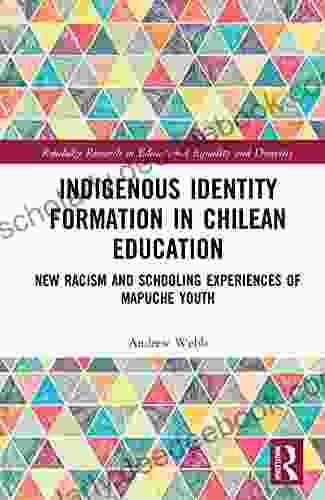New Racism and Schooling Experiences of Mapuche Youth: The Interplay of Coloniality, Neoliberalism, and Indigeneity in Post-Dictatorship Chile

Abstract
This study examines the schooling experiences of Mapuche youth in post-dictatorship Chile, focusing on the interplay of coloniality, neoliberalism, and indigeneity. Drawing on qualitative research with Mapuche youth, their families, and teachers, the study explores how new forms of racism shape their educational opportunities and experiences. The findings suggest that Mapuche youth face multiple forms of discrimination and exclusion in schools, including microaggressions, stereotypes, and cultural devaluation. These experiences are compounded by the neoliberal policies that have transformed Chilean education, creating a system that is increasingly marketized and segregated. The study also highlights the resilience and agency of Mapuche youth, who resist and challenge these forms of oppression through various forms of Mapuche cultural revitalization.
5 out of 5
| Language | : | English |
| File size | : | 7134 KB |
| Text-to-Speech | : | Enabled |
| Screen Reader | : | Supported |
| Enhanced typesetting | : | Enabled |
| Word Wise | : | Enabled |
| Print length | : | 203 pages |
| Paperback | : | 112 pages |
| Item Weight | : | 7.8 ounces |
| Dimensions | : | 6 x 0.26 x 9 inches |
Mapuche youth in Chile have historically faced significant challenges in accessing and succeeding in education. These challenges are rooted in the country's colonial history, which has resulted in the systematic oppression and discrimination of Mapuche people. In recent decades, the situation has been further complicated by the implementation of neoliberal policies that have transformed Chilean education, creating a system that is increasingly marketized and segregated. As a result, Mapuche youth continue to face multiple forms of discrimination and exclusion in schools, which have a significant impact on their educational opportunities and experiences.
This study examines the schooling experiences of Mapuche youth in post-dictatorship Chile, focusing on the interplay of coloniality, neoliberalism, and indigeneity. Drawing on qualitative research with Mapuche youth, their families, and teachers, the study explores how new forms of racism shape their educational opportunities and experiences.
Theoretical Framework
This study draws on a theoretical framework that integrates three key concepts: coloniality, neoliberalism, and indigeneity. Coloniality refers to the enduring power relations and structures that were established during the colonial period and that continue to shape the lives of indigenous peoples around the world. Neoliberalism is a political and economic ideology that emphasizes the free market and individual responsibility. Indigeneity refers to the unique cultural, linguistic, and historical characteristics of indigenous peoples.
This theoretical framework allows us to examine the schooling experiences of Mapuche youth within the context of the ongoing legacy of colonialism and the impact of neoliberal policies. It also highlights the importance of understanding the ways in which Mapuche youth resist and challenge these forms of oppression.
Methodology
This study was conducted using a qualitative research approach. Data were collected through in-depth interviews with Mapuche youth, their families, and teachers. The interviews were conducted in Spanish and Mapudungun, and they were audio-recorded and transcribed. The data were analyzed using a grounded theory approach, which allowed for the identification of key themes and patterns in the data.
Findings
The findings of the study suggest that Mapuche youth face multiple forms of discrimination and exclusion in schools, including microaggressions, stereotypes, and cultural devaluation. These experiences are compounded by the neoliberal policies that have transformed Chilean education, creating a system that is increasingly marketized and segregated.
Microaggressions
Microaggressions are subtle forms of discrimination that can be intentional or unintentional. They can include verbal, behavioral, or environmental slights that communicate negative messages about a person's race, ethnicity, or other marginalized identity. Mapuche youth reported experiencing a range of microaggressions in schools, including being called names, being told to "go back to your country," and being treated as if they were less intelligent than their non-Mapuche peers.
Stereotypes
Stereotypes are widely held beliefs about a particular group of people that are often inaccurate and harmful. Mapuche youth reported experiencing a range of stereotypes in schools, including being seen as lazy, unmotivated, and criminal. These stereotypes can lead to low expectations and discrimination from teachers and other students.
Cultural Devaluation
Cultural devaluation refers to the process of貶低ing the culture and values of a particular group of people. Mapuche youth reported experiencing cultural devaluation in schools in a variety of ways, including being told that their language is inferior to Spanish, that their culture is "primitive," and that their traditional ways of life are not valid.
Neoliberal Policies
The neoliberal policies that have been implemented in Chile over the past several decades have had a significant impact on the schooling experiences of Mapuche youth. These policies have resulted in the marketization and segregation of education, which has led to increased inequality and discrimination.
Marketization
The marketization of education refers to the process of turning education into a commodity that can be bought and sold. This process has led to the creation of a two-tiered education system in Chile, with private schools offering high-quality education to those who can afford it, and public schools offering a lower quality of education to those who cannot. Mapuche youth are disproportionately likely to attend public schools, which are often underfunded and overcrowded.
Segregation
Segregation refers to the process of separating people from different groups into different schools or classrooms. This process has led to the creation of schools that are predominantly attended by Mapuche students. These schools are often located in poor and marginalized communities and offer a lower quality of education than schools that are predominantly attended by non-Mapuche students.
Resistance and Resilience
Despite the challenges they face, Mapuche youth are resilient and active agents in their own education. They resist and challenge the forms of oppression they experience through a variety of strategies, including cultural revitalization and political activism.
Cultural Revitalization
Cultural revitalization refers to the process of reclaiming and preserving one's culture and language. Mapuche youth are engaged in a variety of cultural revitalization activities, such as learning Mapudungun, participating in traditional ceremonies, and wearing traditional clothing. These activities help them to connect with their culture and to resist the dominant culture that seeks to assimilate them.
Political Activism
Political activism is another way that Mapuche youth are resisting and challenging the forms of oppression they experience. Mapuche youth are involved in a variety of political organizations that are working to advance Mapuche rights and to promote social justice. These organizations are playing an important role in raising awareness of the challenges facing Mapuche youth and in advocating for change.
The schooling experiences of Mapuche youth in post-dictatorship Chile are shaped by the interplay of coloniality, neoliberalism, and indigeneity. Mapuche youth face multiple forms of discrimination and exclusion in schools, including microaggressions, stereotypes
5 out of 5
| Language | : | English |
| File size | : | 7134 KB |
| Text-to-Speech | : | Enabled |
| Screen Reader | : | Supported |
| Enhanced typesetting | : | Enabled |
| Word Wise | : | Enabled |
| Print length | : | 203 pages |
| Paperback | : | 112 pages |
| Item Weight | : | 7.8 ounces |
| Dimensions | : | 6 x 0.26 x 9 inches |
Do you want to contribute by writing guest posts on this blog?
Please contact us and send us a resume of previous articles that you have written.
 Novel
Novel Story
Story Genre
Genre Reader
Reader Library
Library Paperback
Paperback Magazine
Magazine Paragraph
Paragraph Shelf
Shelf Preface
Preface Synopsis
Synopsis Footnote
Footnote Narrative
Narrative Biography
Biography Memoir
Memoir Encyclopedia
Encyclopedia Thesaurus
Thesaurus Narrator
Narrator Character
Character Resolution
Resolution Librarian
Librarian Catalog
Catalog Card Catalog
Card Catalog Borrowing
Borrowing Stacks
Stacks Archives
Archives Periodicals
Periodicals Study
Study Lending
Lending Reserve
Reserve Reading Room
Reading Room Rare Books
Rare Books Interlibrary
Interlibrary Study Group
Study Group Dissertation
Dissertation Storytelling
Storytelling Awards
Awards Reading List
Reading List Book Club
Book Club Theory
Theory Brent Von Horn
Brent Von Horn Suzanne Harper
Suzanne Harper Nicholas Tampio
Nicholas Tampio Jessica Labar Twomey
Jessica Labar Twomey Jackie Smith
Jackie Smith Graham Tippett
Graham Tippett Nikki Loney
Nikki Loney Diane Solomon
Diane Solomon John Deferrari
John Deferrari Ainsley Beekersnap
Ainsley Beekersnap Thomas A Watson
Thomas A Watson Dr Dave Cambrigton
Dr Dave Cambrigton Kaffe Fassett
Kaffe Fassett Frances Widdowson
Frances Widdowson Wyn Thomas
Wyn Thomas Brian J Karem
Brian J Karem Pete Stamper
Pete Stamper Debbie Tomkies
Debbie Tomkies Nick Capodice
Nick Capodice Vivek Iyer
Vivek Iyer
Light bulbAdvertise smarter! Our strategic ad space ensures maximum exposure. Reserve your spot today!
 Sammy PowellFollow ·12.6k
Sammy PowellFollow ·12.6k Kevin TurnerFollow ·14k
Kevin TurnerFollow ·14k Stanley BellFollow ·14.9k
Stanley BellFollow ·14.9k Patrick RothfussFollow ·5.1k
Patrick RothfussFollow ·5.1k Shaun NelsonFollow ·5.9k
Shaun NelsonFollow ·5.9k Ivan TurgenevFollow ·11.8k
Ivan TurgenevFollow ·11.8k Shannon SimmonsFollow ·17.6k
Shannon SimmonsFollow ·17.6k Curtis StewartFollow ·2.7k
Curtis StewartFollow ·2.7k

 Houston Powell
Houston PowellMusorgsky and His Circle: A Russian Musical Revolution
Modest Mussorgsky was a Russian...
 Barry Bryant
Barry BryantRanking the 80s with Bill Carroll: A Nostalgic Journey...
Prepare to embark on a captivating...

 Kelly Blair
Kelly BlairThe Diplomat's Travel Guide to Festivals, Holidays, and...
India is a land of vibrant culture and...

 José Saramago
José SaramagoFancy Nancy Nancy Clancy: Late-Breaking News!
Nancy Clancy is back with all-new adventures...

 Trevor Bell
Trevor BellGestalt Psychotherapy and Coaching for Relationships: A...
Relationships...

 Federico García Lorca
Federico García LorcaThe Last Love of George Sand: An Enduring Legacy of...
At the twilight of her remarkable life,...
5 out of 5
| Language | : | English |
| File size | : | 7134 KB |
| Text-to-Speech | : | Enabled |
| Screen Reader | : | Supported |
| Enhanced typesetting | : | Enabled |
| Word Wise | : | Enabled |
| Print length | : | 203 pages |
| Paperback | : | 112 pages |
| Item Weight | : | 7.8 ounces |
| Dimensions | : | 6 x 0.26 x 9 inches |












